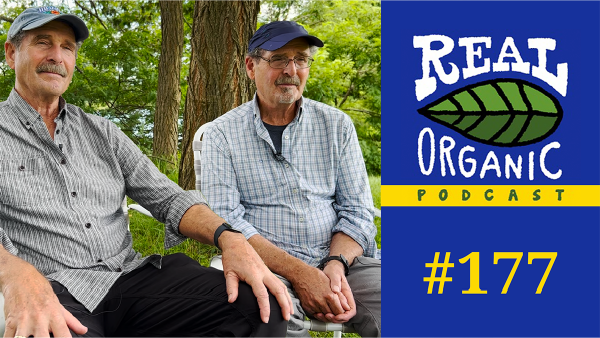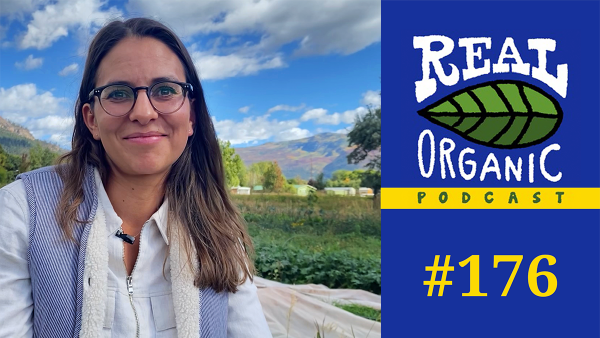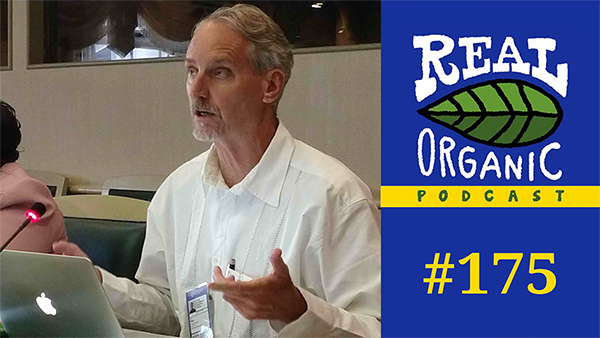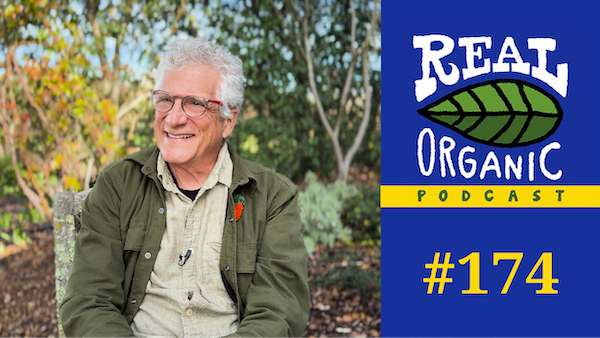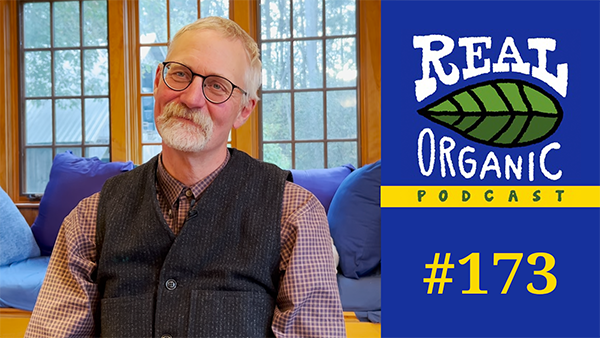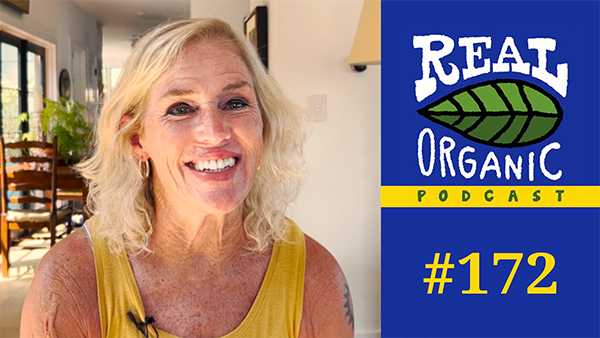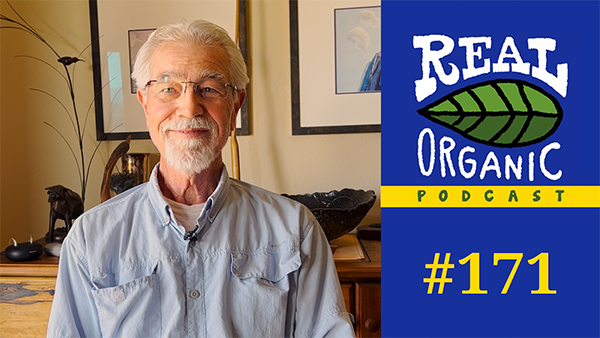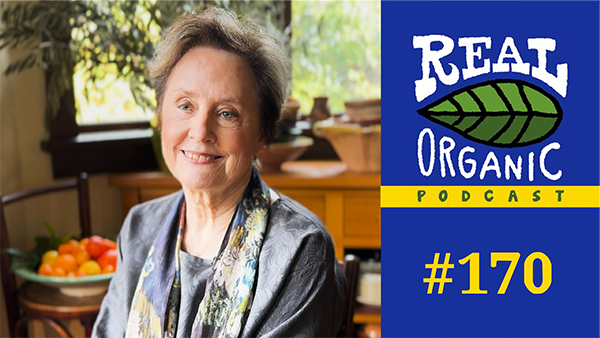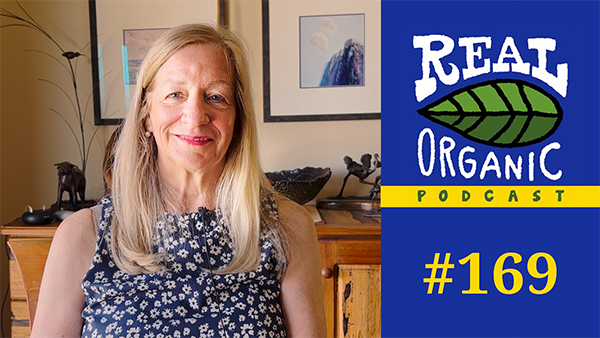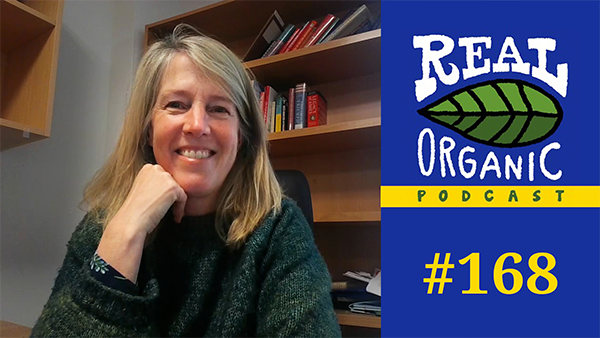Episode #178
Mwatima Juma: Chemical Companies Pressuring Farmers In Africa
Welcome! You can subscribe and download episodes of our show through your favorite podcast app.
You can also subscribe to receive the video version of each episode on our YouTube channel.
Our Mwatima Juma interview has been edited and condensed for clarity.
Dave Chapman interviews Dr. Mwatima Juma, May 2023 :
Dave Chapman 0:00
I’m very pleased to talk with Dr. Mwatima Juma. And welcome Mwatima.
Mwatima Juma 0:06
Thank you very much. It’s an honor.
Dave Chapman 0:08
It was kind of serendipity that we found each other, you reached out to me to try and connect you with the USDA?
Mwatima Juma 0:16
Definitely, yes.
Dave Chapman 0:17
And that worked.
Mwatima Juma 0:18
It was my last resort of how will I get these people, they seem to be untouchables, and nobody was helping me with the embassy, both here and in Tanzania. And I went to my old colleague friends in the organic world, they said, Okay, I’ll give you the emails. And you are the only one who answered my email, as silly as it was, with a strange questioning, asking, and we meet.
Dave Chapman 0:48
That’s wonderful. I didn’t think it was the least bit silly. So it’s a pleasure to be talking with you, you know, the organic movement in America is pretty big, and the market is the biggest in the world. And Americans have very little connection with the organic movement in the rest of the world, which is craziness. It didn’t come from America, it came from India and Europe, and it’s spread all over the world. So it’s a privilege to be able to hear the perspective of people in different continents. So could you tell me so? You’re the Executive Director of Sustainable Agriculture in Tanzania?
Mwatima Juma 1:32
No.
Dave Chapman 1:33
Not anymore? You’ve done that. Okay.
Mwatima Juma 1:36
I’m the Chair for Tanzania Organic Agriculture Movement. It’s an umbrella organization, which we get together all like-minded in the organic movement, be producers, processors, people who are taking care of farmer training and the like, in terms of pushing the organic agenda to the government. And the status quo now is we don’t have what we can call a space within the Ministry of Agriculture in the government about organic, it seems like there’s… doesn’t want to agree that there is another way of doing farming, apart from subsidizing chemicals, and feeding people with all those chemicals. So also organic is run by the traders, who are exporting the export crops in organic or the people like us, who are the kind of an activist who says enough for us to be eating things which are poisoning ourselves. And my mission here was like, people believe in the US, unfortunately, I don’t know what you’ve done to the world, but they think like if something is done in America it’s good.
Mwatima Juma 1:36
And what makes me angry is every time we get support, there was no mention about, we could support you to develop your organic corner within your country, nothing is mentioned. So most of the government people believe that you are not organic, your government does not support organic, you’re all conventional because that’s where you can feed the world with…this crappy mentality that is going around. So this was my private visit, I paid my own money, I said, I need to go to see these people. What are you doing, and why when you have USAID support Feed the Future, you are not giving them an opportunity to do this. And yet, your list of the thing that you even want to import, even looking at the business side not even looking in terms of sustainability in our production, there is a huge room for that kind of support. And it will be not much as you are pushing for the…industrial agriculture.
Mwatima Juma 3:59
So I thought if I come here, and now that I have been supported to be an advisor, the President has chosen me among the six of us, five of us, to be advisor in agriculture. And I thought this my opportunity to push in the organic agenda. But if I just keep on saying they will still say you are primitive, you’ve been brainwashed, you don’t know what is going on in the world. So if I came back and say I met the people in USDA, and this is what they’re doing, they have a transition project. They support their people to move organic. We need a small push for people to go organic. They use billions, $500 million in support, in subsidy support. We could do with a very little of that and we could make a big difference. So that’s that’s the whole thing.
Dave Chapman 4:52
$500 million in support of chemical agriculture?
Mwatima Juma 4:57
In support of the organic transition project. This is what
Dave Chapman 4:59
Oh, in this country.
Mwatima Juma 5:01
in this country, our country, the support for the chemical for the subsidy of the fertilizer is crazy. I don’t even want to remember their figures, but always every budget, they will have a subsidy for chemical fertilizers, subsidy for chemical pesticides, a free trade of the chemicals. You cannot believe that we even until now we have 44 identified highly hazardous chemicals that are still registered. And we talk and the government says oh, yeah, we realize that we put them into account, we will deregister them. No, they have not been deregistered. There is not even a space, a place for them to collect it. There’s a lot of it in the go-down which is leaking into the environment. We are a timebomb in terms of the…pesticides and all these other chemicals that are moving around. You can just walk into the market and buy whatever you want.
Dave Chapman 6:01
Dr. Juma, let me ask you. How did this happen? When did this happen? Right. It’s not that world agriculture was always chemical. So how did it become so dominant? In Tanzania, in Zanzibar, in East Africa.
Mwatima Juma 6:18
It happens at the time, I when I go and talk to the farmers, I always tell the farmers that I beg forgiveness because I’m the one who believes in an industrial agriculture. And because I’m born and raised on the farm, which is solely organic farm, we can talk about it later. And my father was a farmer. He did not recognize himself as organic. But he was doing all those…what are supposed to be the organic farming way. And when I went to do my first degree at the Suquina University, when I came back, I said, we got to move, we got to use NPK you got to use urea, we got to use this, because if we want to increase the yield, this is the things because we have tested them in the university and they work. And my my my father would say, Oh, don’t be silly, we have cows, we have chicken, why would I go and buy something else for fertilizer while I have these on my farm. So I thought maybe my dad was just mean, that really doesn’t even know what it is in advancement in agriculture.
Mwatima Juma 7:31
And FAO came in and give the fertilizer subsidy. In those days, in the 60s and 70s the subsidy was coming from the organization like FAO free. They are dumping bags and bags of fertilizers to the farmers to use them without any further guidance. And I don’t blame that because maybe…at that time, the yield was increasing. But before we realized what it’s really doing, the impact of it, we were okay. We thought we were okay. Unfortunately, now we’re realizing what we have done to ourselves, it’s time to say that was wrong. Let’s move out, we still hesitate. Because it was a time with a DDT. It was the time with the using gypsums and using all these asbestos. It was the time when we thought this is really the… This is something that can help us to advance. So that’s what’s the start come in. And then that generation and if I look at myself, now you’re telling me what was your traditional, is only a little bit that remains for me because I was raised on the farm.
Mwatima Juma 8:44
But the rest of the generation of the farmer they will not have what has been farming before. Because they were gradually pushed into chemicals and they were using them and slowly until they get to the stage, everybody within the Ministry, technical people, they’re all like, it will not work. They can even tell you that you cannot grow rice without using chemicals. You cannot grow tomatoes without using this strong pesticide. And every time you get the new ones, we get the new ones. To me, I said you know guys, what is happening here? We are the market of the industrial chemicals. And we are the victims. Our farmers are the victims because there’s somebody here making money and they don’t want to lose that market opportunity. So every time I go do cross reference, how much of the area in Europe is going organic? I say as much as they go organic, they look another area which could go conventional so that they can get a market for their input.
Dave Chapman 9:48
Yeah.
Dave Chapman 9:48
If USAID comes in, and they say this is Feed the Future. All the package has to be associated with chemical, with hybrid seeds, with improved whatever they call it seeds, we are kind of trying to be resistance for GMO, but I don’t know for how long will we be able to do that. But definitely, the variety that we…are using for organic productions are not befitting the situation because they have been raised to be having easy access of the chemicals. As soon as they touch their nitrogen is there. And now you’re planting it with a compost. With a Bokashi, with a farmyard manure, and then you want it to yield the same. But everybody recognized the quality. We don’t get the micronutrient that we used to get because now then we need to go back to another business. Now the Americans are coming in with the business of fortification. Your maize doesn’t have Vitamin A, why? We don’t ask because it doesn’t reach those boron in zinc down there because the roots of maize now grow just two inches. Because everything is supplied there.
Dave Chapman 10:59
I tell them like…we turn our plants into drug addicts, we ourselves, our children are drug addicted, and now we are turning the plants into drug addicts. They will not grow, they want everything and we are destroying our environment. So, if it is gaining here that slowly, on that side is much slower. Because they are getting much bigger push from the people, we believe, that they know what is good for us. And they can do a lot of these crappy forecasting of increase in population and no yield, and what and what, that’s nonsense. If everybody is going organic and you’re all small, and you make sure that you get something to eat every day you increase your diversity, then you don’t need to worry about producing 1000s of hectares of corn to feed the world. That feeding, everyone feeding themselves and then every little more that that is left it goes to the market. So that’s where we are, we are in a trap. Because now we are the market.
Mwatima Juma 12:02
And we are not afraid to say people like Syngenta, like Monsanto, they will never let go loose people, like this program of Agra Green Revolution is all about increased use of chemicals in the country, because we are too low. Our chemical use in fertilizer is only four kilograms, compared to 100 kilogram that the other countries are using without perfecting other issues that are pertinent. Get us better assortment with our waters, our irrigation system. Perfect that one, and then we don’t need to put all those chemicals…into our environment. But that is the agenda that is coming. Agenda, and now they’re using the word sustainability in a kind of a confusing way. So really, that business has to continue.
Dave Chapman 12:57
So you…had a transformation from what you believed as a young college student to what you believe now? What was the process of…that awakening? At what point did you go? Maybe my dad has a point or did you go you know, maybe the professors don’t have everything? What happened with you?
Mwatima Juma 13:20
Yeah, when I finished my studies, I was employed in the Ministry of Agriculture, and I was in the area of research and extension. And then we had these people who are coming in, looking for organic products in the 90s. And I was, what is that? There was a German lady with a certification organization at that time, it was called IMO. And she came down and we start talking and, let me understand this, what are you talking about? Oh, this…is what is happening. This is not good for your health. And now people in Europe, oh, they want this black pepper, they want their tumeric they want their ginger, they want it to be organic. So we are looking to have them certified and Mwatima, if you’re interested, we could work together, you could become an inspector. And then we teach you a bit what to look around for. And then we’ll teach the farmers how to do it, because there were some crops which are really predominantly chemical and there were some crops which you just grow it, and it goes wherever it goes.
Mwatima Juma 14:27
So that was my first induction into, ah, and then that same year we were like hell, why they weren’t organic, and they are the ones who told us that we should use these things, have them or. And from there on then we went, we met with other colleagues and we said we are inspectors. I was an inspector, did a lot of inspection work. And then I graduated to becoming a teacher for inspectors. So I was teaching young people what to do in the inspection. But the focus is with the traders. So for us organic came in through the traders, they want this. So you have to do whatever you can do to make sure that you fulfill the market need for that. So we were like, this is not fair. What about ourselves? And that was an uphill struggle. Because everywhere where these farmers are becoming organic farmers, it’s because of the market opportunity. It’s because of that trader, the John, Jim, the whoever it is, we want those products and don’t care about other products that are around.
Mwatima Juma 15:37
We want coffee to be organic. When you have coffee organic, it means the beans that are growing under the coffee is organic, the banana is organic, but you don’t sell that as organic, you don’t have a market separate. But people will realize that their health has improved, because now they are very strictly they don’t want to lose that premium market that they are getting. So if the government focus in the 90s didn’t continuously push for that the agenda we would not be in this situation now. But for them was like oh, this is done for, we call the white people wazungu, this is done for those wazungu, they’re crazy. Let them…get what they want. Because they are ready to pay double, three times, four times the price, okay, I can do for them, or not for ourselves. And that’s where I get into the organic. It’s not like it just happened and from there on then I was like an activist.
Mwatima Juma 16:30
I went into IFOAM, to be in the board of IFOAM, I was into…several different bodies within the within the IFOAM organization. Body that looks into equivalent. And then we find, we managed to put up this Tanzania Organic Agriculture movement, the East African, every country has a national Movement, we got it together, we got a little bit of support here and there. We go up to making East African Organic Standard. And we have an East African organic mark. And now we have really fall back in terms of making sure that people are using the East African organic standard and using the mark, it’s nothing to do with export. But if the people who wants to export comes in and you are using the East African organic standard, you are already two steps ahead of what is supposed to happen in organic. But we need a little bit of recognition in the market. And for me this is the outcry once I get out of here going back and say okay, USAID, a little bit of this is even 500 million shillings, I mean dollars. This will help me to institutionalize those who are ready to use the mark for the sale local.
Mwatima Juma 17:46
And how…and I was looking for this consumer organization I asked great, you know this consumer organization? How do they make consumers, make a noise? What do I need to do in Dar es Salaam to get the consumers say, no more, we don’t want that spinach which is growing in that place, because we know that people are spraying. And if you hear the spraying stories, it’s horrific, we don’t even just spray in the field. When it is harvested, it doesn’t go to a lorry because the lorry guy found out a concoction that he makes mixing of different chemicals that you need to spray it after harvesting for transportation with the belief that it increases shelf life.
Dave Chapman 18:31
That is, and you know, I read a book about agriculture in Mexico and it was about the death of a farm worker from pesticides. And it was, but about the whole system and how little protection there is for the people who do the work in the fields that just, you know, there are no laws to protect them. There are…no laws for worker safety really that are enforced at all.
Mwatima Juma 18:58
No, no. And when you go to the government agency who is dealing with that, and recently, in this year and the beginning of the year, we had a discussion with them. And with all the proof even from their own scientists, this is what is happening, testimony from the field. People have to close the doors and keep their kids inside during the spraying in these onion fields because then they cannot breathe properly. The itching of the body, all these are there. And when we say, but why don’t we just remove these ones, at least start with removing this one that very harmful. And they’ll all say, No no, no. We are going to teach our people protection, safe handling. Honestly, safe handling with the poison? So the safe handling with the poison. There is no safe handling. You got to dress yourself like you’re on the moon with that heat and humidity. How can you start spraying with all those things? They don’t. It’s so cumbersome.
Mwatima Juma 19:58
We’re not used to the glove thing. The people who have been raised since childhood, don’t touch anything without putting on gloves, see we are feel, and touch and use your fingers. People are doing this with the chemicals with their own hands. The containers are beautiful. They are not being thrown away, they will say I have washed it. I will reuse this. One time, with a…glyphosate, we call it you used to call it 2-4-D, the container is very nice. It can be used for drawing water in the well. The guy says oh, I washed it. Don’t worry, Mwatima, it’s clean. I washed it. And we’re like, oh my God, and they’re using it to draw water.
Mwatima Juma 20:36
And nobody is measuring the extent of contamination in the water, contamination in the soil. And there is no follow up. My going around, I was arguing with the people and I said, You people, you can use chemicals. But you know, if you spray, and it has been already announced by weather system like it is blowing this direction, you should not spray, you will be sued your life. In our place, nothing. If you feel you want to spray, whatever you spraying, when we started with a free trade in the 80s that’s allowed free trade of commodities. That’s when the chemical come in. Pathetically, when I was in Biofach this year, and last year it was in summer. And we were in the panel discussion with the Minister for Ag, Junior Minister for Agriculture, Deputy Minister, whatever they call them. And I said okay, this buyer and Monsanto are here. And they are the owners of this list of chemicals, which has already been proven to be having cancer, hormonal imbalance and all sorts of issues with them. What are you going to do to help us?
Mwatima Juma 21:50
And it was like, it’s a capitalist country, these people are doing their business. If you don’t want this chemical, it’s on your government, have to do something about it, they should not import, we are not forcing them to import. And I was like what? So this is how it is for us. And we are still thinking like these people are our friends and they are supporting us, while they are protecting their business provided that Monsanto and buyers are paying their taxation, and they are feeding that government with the money, they’re not going to be touched. I go back, and we talk and we tell guys we are on our own if we don’t do something, we’re gone. Because this is a situation there. This is a new business. This is a new colonization. This is worse than the colonization which we had when we have the colonialist in the country. And let them make sure that they are not going to get to eat this poison. Now this is a different one. This is economic colonization, we will be bound to them.
Mwatima Juma 22:50
This time of a crisis in Ukraine, and the fertilizer we should not have subsidized. We should have paid to see how we can get black soldier flies to make compost quicker and put that in market We should use our youth how they can trade in compost making and open up small stores everywhere for the people to go and get easy access, we will be adding value to our people, getting employment, and conserving our soils. And yet, we take all our reserves and then we go back again, black market whatever it is, and buy the chemicals of Yara, we’re just sitting out in the Indian Ocean, packaging the things from the same nitrogen which God has given us with the same legume which we have in our land, which we know if you plant your maize with pigeon peas, you don’t need urea. Scientifically proven, but we don’t want to go for that. Don’t need urea if you grow your lines of maize with the pigeon peas. First you improve diversity and then they fix the nitrogen for you. But we are ready to open up godown for Yara to store their chemical fertilizer. We are ready to buy, the government is buying all the fertilizer from Yara upfront. And then subsidized by 20% to give it to the farmers and who’s making business here.
Dave Chapman 24:18
Yeah, yeah. So very hard cycle to break, isn’t it?
Mwatima Juma 24:23
Absolutely.
Dave Chapman 24:24
Yeah.
Mwatima Juma 24:24
But I believe slowly, slowly, something happens, sometimes I go like Oh, maybe this, but sometimes I say no, no, no, no, no. This is this is too much. It might be somewhere, we might be able to do something. Yeah.
Dave Chapman 24:41
It’s…very exciting to see not just growing organic for export but growing organic for the people who live there. So is there a movement? I mean, I know that’s what you’re working on. But is there a growing awareness among people that, that’s the food we want to eat?
Mwatima Juma 25:01
Very, very slowly, because it’s the same movement which we started with the farmers, we should have started with the consumers. But now, unfortunately, it is costs. For me, I would say, if I could finance testing of the, of the product in the market, and I could be able to be allowed and the government will not shut me down to announce the results. Definitely people will say, No way. No, no, no, no, because everybody know that we are 400% more of the chemicals that we are consuming from the local market. But we are very strong in putting order that we don’t want to be embarrassed with the international market, because then things get to be rejected. And we want our farmers not to lose that international market. So we are not measuring our own products and people need data.
Dave Chapman 26:09
Now, when you said 400% and measuring your own products measuring for pesticide residue.
Mwatima Juma 26:15
Pesticide residue,
Dave Chapman 26:16
Yeah, so.. the stuff that is grown domestically and sold there has very high pesticide residues.
Mwatima Juma 26:23
Absolutely.
Dave Chapman 26:24
Yeah.
Mwatima Juma 26:25
And we don’t announce it.
Dave Chapman 26:28
The government does not want that to be announced.
Mwatima Juma 26:31
And they don’t want to be announced and they are not taking action to reduce it. But they also they don’t want to announce it. So we are like, Okay, if you don’t announce it, then gradually take action to reduce it. And people want to have data. So we don’t have data because for the civil society organization, we have no capacity to do all these costly testing. For me, for Zanzibar, we have seen an increase in cancer rates, I could say is from the pesticides sprayed on our vegetables, because we have gone too much in these couple of… 5-10 years ago. We don’t have industry to say that this is coming from the mercury from the industry. The only thing is, we are now spraying even our local vegetable, which has never been sprayed before. We are now spraying it with chemicals. But how can I connect between this cancer increase?
Mwatima Juma 27:35
If I go to the hospital and ask the guys, can you tell me a little bit what is happening? And I’ll say yeah, we’re now getting more and more people with this kind of a cancer, breast cancer, we’re now getting a lot of people with fertility issues, every young family has to go through to Dar es Salaam to get whatever infertility testing or implanted because they can never consume any more. And we could see there are a lot of deformed kids that are being born now. This has been an increase. But nobody’s associating it with the, what is the cause of it, even if it is a small percent to us, we believe it’s from the pesticides that are being used in the field. Other things could be the…livelihood changes, the way we are eating too much, oil everywhere, too much thinking fast food and the life.
Dave Chapman 28:31
Yeah, yeah. So processed food is also coming in.
Mwatima Juma 28:36
I mean.
Dave Chapman 28:36
Yeah.
Mwatima Juma 28:38
It’s…the modernization, thiis advancement, is leaving, like waste.
Dave Chapman 28:44
Yeah.
Mwatima Juma 28:44
Yeah. You just go into the supermarket and buy some package and just open it and warm it. And the microwaves are already there also and put it in the microwave and you eat it and you’re quick.
Dave Chapman 28:55
Yeah, yeah. In that way. There’s a much greater impact than we imagine in the US for what we do, because we have influence. And, but we don’t, we’re often not aware of that. But the consequence of protecting organic and growing real organic, is…can be great. It can be great for people, we never see that we never meet.
Mwatima Juma 29:23
Absolutely. And for me the people are like, Are you paying your own money to go? I said, Yeah, and I go for knowledge. I want to seek knowledge. I want to see these people. I want to see how they’re doing. I’ve been struggling here because the only thing which is different from us, is you don’t just walk to the farm and say, I’m here I want to see your farm. You have to have an appointment and then okay, this is closed, this is open. We still want to travel to see one of the farm close by in Oakland here. What is happening in their…farm, in their activities. A small exchange like that really helps you to say yes, this is possible and it is real and it is coming.
Mwatima Juma 30:04
And the opportunity for us is, since the 90s our outcry was we are transitioning, we are perfecting our organic, we are not like your…space, you have people who are 100% conventional, and in a real sense of conventional and now they want to convert. For us we are not converting we are transitioning, We want to perfect what is organic for us. And the unfortunate thing is it gets a connotation like this is primitive, you should not go back to the primitive. And I say, No, it has science, it has a great science into it. I want to know if I have effective bacteria, the nitrogen fixers are really, really effective, I want to have a tool that I can check my rhizobia and make sure that they are really doing their job. I want to have a tool that I can count all my worms and all these microorganisms in the soil, to measure the fertility of my soil. Biggest outcry is, this work on this soil because for us on the island, we have no chance of increasing it. But we have a chance of destroying it.
Mwatima Juma 31:20
And then to bring back is going to be very difficult. So if we manage to maintain, we don’t have a reason to move around. Improve the fertility, get these guys what they want, and you can continue producing. So going organic, and if the US, or western countries, were really looking in, let’s support development and business. And we’re not going to buy anything from you which is not organic, and you should not do anything within your environment which is not organic, we will have made a big step because for us it will be cheaper. It will not cost. Unfortunate thing is we are again, and I believe these industrialists guys, the multinationals, they are bringing in the poison telling our farmers that if you go organic, you’re going for the rich people. And I’m like, you’re growing for yourself, don’t be stupid, who, which rich people you are growing for? Or you are growing for the rich people because now these things available in the market will not be able to buy. So are you ready for the people in the market to buy poison, just because they are poor. And that is you’re helping them because this one will have a increase in price? For me on my farm, I said, I don’t increase in price. But I got to the stage whereby I sell with the trust.
Mwatima Juma 32:37
And this is where the organic should go, we should sell with the trust. We don’t have to go through the certification. And once you talk about that, then the technical people in the ministry jump immediately into the certification, oh, this is very expensive, we cannot make ends meet here. People will not be able to buy this stuff in the local markets. No, we have to go back into the calculation of cost of production and put figures on the table. How much does it cost you to produce organically and how much does it cost you to produce conventional. Because for your conventional it’s neither here nor there you are not even using what is supposed to be used, you are not going as per what has been prescribed because of the costing and you are buying anything that is available. So if you look into the cost of production, it doesn’t cost me more, than I don’t see why should just sell more.
Mwatima Juma 33:30
So I sell my bunch of spinach at the same price, but I finished selling it before people go to the other one. They go to the market now they go, I’ll take this one, then they don’t, then you don’t have to worry because you’re selling it at the same price but you’re selling quality so people are ready to buy the quality. But when you start putting into the mind of the farmer that once you don’t use chemical then you are upgraded to get 10 times I mean the price like we see in the supermarket, here in America and in Europe, we cannot compare with us. So those are the mentality to kill the development of organic, telling people that once you go organic you should be, you deserve to be paid more. For what?
Dave Chapman 34:16
Yeah. So who do you think really wants organic to not work? Like who is trying to make it that organic does not grow and flourish in Tanzania?
Mwatima Juma 34:33
Anyone who has a business who has already built his own multinational plant for production of pesticides and chemicals, and worrying of because you people, you are good when you go crazy we don’t want this, you really go you don’t want it. So they could see. These guys, they do all these what they call projection and they could see that the only place now for market of our chemical is in Africa, in general. So if we don’t capitalize if we don’t start giving them now, these flimsy grants like what USAID is doing, before in the 70s, they were nowhere near agriculture and all of a sudden you see them coming in that regard to Feed the Future. This is creating your future market. Because then you are telling people you cannot do this without spraying this guy, this guy with terrible names, difficult English wording, complicated, chloro fluoro…blah, blah, blah, and make them believe that if the bottle is like this, and these things are written there, this is most effective compared to my neem and the garlic that I’m mixing it myself, my effective microorganism that I grow myself under my mango tree in the screenmade and boil it in a solution, the molasses that I use, because I don’t have that sophisticated bottle and I don’t have all those printed bottles with a funny name.
Mwatima Juma 36:04
So…those are the guys who will say some rain come sunshine this organic should not go in these countries. They will if we let organic go, it will be cheaper for these people to be organic, because their resources are within their proximity. They get their pesticide within themselves. They get their fertilizers within themselves they get all what they need within their own setting of the farm. They will be independent, once we allow that to happen, our business has gone down. So definitely they will not allow that. So anyway, you turn around, you say can you get us a grant because we want to do this and that now. We don’t we don’t do those kinds of things. We’re not supporting that kind of thing. You hear a lot of different stories, then you know the guy is there. If you hear big money Bill and Melinda Gates is going to give us in August, for this is going to be a multi million people have already been in Ghana, Senegal to do a big compact, this is where revolutionising agriculture, this is where going towards sustainable agriculture.
Mwatima Juma 37:13
This is where we are going to look into our soils. And then we’re like, what are you looking into the soil? We’re looking into the soil, because now we will have a machinery that will measure NPK. We isolate the elements. And we know in organic, you don’t isolate the elements. And they isolate the element with all these titration kind of thing. And then they will tell you NPK is needed to increase the business back. We will not…it’s a big struggle, because you are touching pockets of the very big people. I will not allow you to do that.
Dave Chapman 37:46
Yeah.
Mwatima Juma 37:47
They will challenge you and before you realize you can be completely naked. Where is your proof? Who said that is causing this? What is your Sunday figure ground that and all the research, what we are doing is adaptation of fava beans with NPK regimes. One kilogram, two kilogram three kilograms, we are still doing research, facilitating their business. You’re touching my emotions, I can be really emotional in this discussion. They all know that, they go, Ah, Mwatima,if you start talking about organic, she can just go like, ah.
Dave Chapman 38:23
Okay, this is very good. I have a question about something that you said. If organic farming in Africa is to be successful, we cannot simply copy the European way. Do you remember what you might mean by that? Could you talk about that a little bit?
Mwatima Juma 38:41
That it will admit European way?
Dave Chapman 38:43
That it…there is something that can’t just be copying the European way it has to be the African way? What did you mean by that?
Mwatima Juma 38:52
Because, I don’t know, I believe that our tropical environment. And we all know that’s where life has started. I don’t blame, I like snow because it has also its own usefulness. But I believe that to the environment that we have been ordained by being there in the tropical environment is very, very conducive to be the organic way. And as per example, you said okay, if you plant your plant, your marigold this will control, everything will be growing. If you don’t interfere with the soil, a lot of stuff will just be growing and they will be used. We use our weed for making compost so you don’t have an issue of bringing in now the big business of a weed killer, of glyphosate, telling farmers that away on breaking your back from bending and weeding. Instead of telling them chop these weeds. Use them to make compost, use them, dry it, use it for the mulch.
Mwatima Juma 39:58
So we will build. And they will. And for me in my mind, they did not look into it in that way. But apart from killing the business of industrialists selling chemicals, we will kill your real organic projects, because we will be producing much better testing the more quality stuff than you are, and we will be producing in the time when you cannot have your broccoli or your wort, we will need a lot of screenhouses you need a lot of energy to produce. We don’t need energy to produce. We will suffer a little bit when we have an unpredictable rainfalls, but still, we will make up much better than you are doing. So if you’re not careful, and if you allow us to open up and support us a little bit to go organic, you’re done.
Dave Chapman 40:53
You’re so you have talked about how your work connects with climate policy. I know it’s a big, big conversation now. Have you…got words for that?
Speaker 1 41:13
Ah, not much, not much, I would say in terms of, because within the umbrella organization, we allow people doing whatever they are doing, provided that we are all of the same mind like we’re supporting organic, but personally, sometimes I feel Yes, climate change is real. But at times, we’re using it to disorient a little bit from how the things should be in the organic way. And it’s very unfortunate, with time, organic has also been getting a bad name or a bad picture, especially when it gets too much associated with a certification and causal certification and the like. And then we lose the opportunity of saying we don’t want monoculture in organic. And then people will climb on that one I say but that’s an organic farm and it is all monoculture, no then some things we need to balance up when we are doing this organic thing to add those aspects that stayed out of it is organic, in terms of a lot of these other things that are coming around regenerative, agroecology, aspects and all that.
Speaker 1 42:39
So every meeting, instead of concentrating, and I blame the multinationals, I think they are doing this on purpose. Instead of us concentrating and we are meeting as an organic-like mandate, instead of concentrating on what are the issue that we can help each other with, we are concentrating, so what’s the difference? Between organic and agroecology between organic and regenerative between organic and permaculture. For me, I said, don’t worry about the difference. Find what are similarities, and let’s capitalize on that. My true concern is I don’t want to lose the market opportunity, which has already been established for years within organic. And these are the guys are coming in before we realize we are losing it because we cannot differentiate between conventional and organic. If people say minimum use is allowed. What is minimum? The minimum for you is not the minimum for me. It’s not the minimum for the other one. Once we come complacent on that one, then we are gone. And then that market is not there anymore.
Dave Chapman 43:50
And you’re talking about minimum use of herbicides for example.
Mwatima Juma 43:54
Yes.
Dave Chapman 43:54
Yes. And fertilizers…what’s happening in much of industrial regenerative? Yes,
Mwatima Juma 44:00
Because in agroecology, they may be talking more of, Plant more trees, a diversity, but don’t worry very much about the use of these chemicals here and they just spray a bit here a bit there. In organic, we say don’t do that. So then they say, Oh organic is very restrictive, these people move to this. For me, this is another danger because then I’m taking people more away from a small opportunity for market that they will have, if they really be organic. Because the guys who are buying…organic, they’re still there, and they are still more and then that causes them to be more and more strict in terms of standards and regulation. Because we are not talking about it. In every meeting. I pointed out, let’s stop lying to ourselves. Let’s ask ourselves, why are we now talking about agroecology? What gets us into this one? Let’s be honest, it is industrial chemicals.
Mwatima Juma 45:02
So why don’t we just go out first, foremost and say, there should be no use of industrial input in an agroecology farm. Oh, no, no, no, no, we cannot do that because you know it is needed. Then, who are you favoring? Then maybe you are also being getting some support funding from the same guys who want to sell their chemicals. They don’t mind a small bit because then if they brainwash everybody that you can be just like organic, by being agroecology by using these kinds of chemicals. Let’s shout it out. I don’t see in your 10 guidelines of agroecology, talking like no use of industrial chemicals. You don’t say it. And if you don’t say it, you’re losing it. And then, you know, there are some aspects of our farm is a permaculture farm. I like permaculture, the concept around it, and I still…no use of chemicals. Whether it is written in the principles of permaculture or is is not written, to me that is fundamental. And then we do our water harvesting, and double planting, and no tillage and all these other aspects, but they will all have a main fundamental backbone that is no chemical use.
Dave Chapman 46:19
Yes. Yes. I just have two more questions I want to touch. One is, I’m just curious, as a woman coming into an industry that has traditionally been quite dominated by men…not in the actual farming, but in the guidance in the people who are speaking and teaching. It has been pretty male dominated. Has that been hard for you? Have you seen progress and change in Africa?
Mwatima Juma 46:52
Big progress. I think now even within the parliament, the people who are talking about issues of agriculture are the women and myself, if I get a chance to meet our Madam President, I really have a nice message for her, to say that if you do this, you’re doing incredible thing to a woman. Because these chemicals, they’re affecting them. They’re affecting them now, physically, if they have lesions in the hands or short breath, but they are affecting the generation to come, because it has been proven that it goes into that very core, egg or cell for the productivity in the generation to come. So we might not see it. Now you might not see it in your children, but in your great grandchildren you are seeing it. We want to alert her that the users of those chemical in the farms are women, because they are the ones who are doing the mixing and they are the ones who are doing the spraying.
Mwatima Juma 47:54
So when the testing goes around, people like Okay, let’s see the men, the farmer is male, that just them but actually they are leaving a bigger portion of who are affected. These are the women, even if they are not directly spraying but they are the ones who spend more time there. When the men finish spraying, because maybe like the knapsack sprayer is heavy, the women has to come in and continue the weeding and harvesting and replanting and stays longer in an environment which is already toxic, compared to the men who sprayed in and maybe put on a lousy mask and then after that throw it away. Equipment is in the house. Chemicals, bottles, everything’s in the house. Women are there in those houses. Now these guys have been so clever. It’s like buying your Coca-Cola, the trade has gone right to the last mile. You can buy glyphosate at the shop in your remote village and they stock it, because they know that there is a market for it.
Mwatima Juma 49:04
So as a woman, we get a lot of that one. My older sister is a parliamentarian. So from time to time we work together to get a question to table it. Last one was, what are you doing with those highly hazardous chemicals? Politician as always, they will answer Yeah, we are working on it. We realize with that…but we said we are quickly continuously. Every session, we will have to have a topic about what is happening with our lives with this maybe that way, then people will realize, Oh, there is something wrong here about this. And there are so many other aspects that could be not seen directly related to the organic, but they are all part of if they are taking care they will be really helpful within organic. The whole policy regulatory mechanism in controlling the pesticide. I’m looking in these emails from pesticide network and I feel jealous Oh US, now we have managed to remove 200. They removed 200.
Mwatima Juma 50:13
So these guys are going, very soon they will have none of these poisonous, even slightly poisonous, chemical because they are aggressive in making sure they talk to their Congress, whatever men, Congresswoman. We don’t want this…it has to go out, it has to go out. And they have funding to do research to confirm, to give data of what is the side effect of what we are doing. We don’t. And we are still there and we are still we are still getting it. So when you look into that one you feel jealous, like Okay, in other countries things are happening little bit, Indonesia way away. And I look into Tanzania and ask those guys and say, Yeah, you’re not sending us any information. And we don’t have resources to do that information. So I wish I will have an unlimited budget within the movement.
Dave Chapman 51:07
That’s right.
Mwatima Juma 51:08
At least report those aspects. We are now on seeds. On traditional seeds. While I’m here, the team had gone to see the parliamentarian about our indigenous, we call them indigenous or traditional seeds, they are disappearing very fast. And for us, we said if you have your indigenous seeds, and you’re growing it under the non indigenous situation, it will not survive because it will not be producing what it’s supposed to be producing and then you will lose it. So they understand that meant they have to set aside support in making sure that indigenous seeds are not lost forever. And what we are doing, we’re not sure if we could trust the same mechanism, which is upfront shouting, like to be up with the development we need to go GMO. And we’re like no, no, no, no, we could do other things.
Mwatima Juma 52:04
First, let them continue with the GMO. And if anything we need, we will just be like Coca Cola will by the end product then and there. We don’t have to do it at the moment because we don’t know what it’s going to do with our with our with the gym class in which is existing. So those is another corner and you is going there. In terms of organic we are also supporting to see that we don’t lose our traditional because we believe that they have more flavor. They have more of the of the vitamins and micronutrients that are needed.
Dave Chapman 52:36
Yeah. So I’m curious if there’s a battle going on right now between the USDA and the European Union. And the European Union has, has created the Farm to Fork initiative. And they are trying to greatly reduce chemicals and greatly increase organic and they’re trying to take that around the world. The USDA hates that. And they’re fighting it, tooth and nail. And they want chemicals to be promoted around the world. So we have these two phonies. It’s very political, it’s very economic. I’m just curious, are you aware of that conflict in Africa? Do you see these forces contending to try and and promote two different futures for the continent?
Dave Chapman 53:30
And it’s very confusing, because the one which is powerful is the US one.
Dave Chapman 53:38
Yeah.
Mwatima Juma 53:39
Because of all aspects, what you call this is, this is how the American are doing thing. This is why they have never had issues of food shortages, because this is how they have been managing their agriculture even though we know that they have lost all these small farms, considerably. And they have all these other issues. And we know that they are growing maize for feeding their cattle and not feeding people. But we still believe. So there is that one. And this one is strong because it has money. International Fund for Agricultural Development, where I had been working for them with them for almost like 15 years. African Development Bank, World Bank, USAID, these are all kind of protecting that, and they don’t want to discuss anything more than if you don’t go modern, you lose out. And to go modern, you get pushed those chemicals into it. So those are there, the European one, they don’t have funding.
Mwatima Juma 54:47
So their support is like now, call for proposal, we support building more for the participatory guarantee systems. And we are only going to work with Uganda, Kenya, Burkina Faso and this and that, I don’t know. What about Tanzania? No, you’re not in the list this time. So and that will be a small amount maybe hardly will be 100,000. What are what are you doing with 100,000? If you want to do really serious thing, and these guys have billions. They allow the workmens’ money to go in and be used to do that. So sometimes I feel with the people when I get them, I just talk to them, You people, you are really, God will see you because you know what you’re doing is not right. And yet, you’re doing it just because that is your job opportunity. And you’re making money out of it, which is not correct. So we know about that, what is happening in Europe. But even there we see them, like they don’t want to control herbicides, these chemical pesticides, and now there is another channel.
Mwatima Juma 55:52
They allow their formulas to be manufactured in China, and China and us, we don’t have an issue. So chemicals now are coming through another backdoor, unchallenged, you don’t even know what is in the composition of it. But we take it in, but we know that this the owner of the trademark is still there, the Monsanto, Syngenta somewhere there, but now they are clean? Because Europe does not allow them to export what they banning in their countries to other countries where they cannot, they’re not export it. It’s done there.
Dave Chapman 56:32
It’s a steep hill.
Mwatima Juma 56:33
It’s a very unfair world you could say.
Dave Chapman 56:36
Yeah.
Mwatima Juma 56:37
So we just hope that we will leave enough time to say, at least to me, is government, have at least a department. When I look into those levels and levels within USDA, that they are dealing with NOP, at least government should say okay, let’s work together with you civil society, but we want to manage regulation. We have no problem we have seen it in Denmark is working is in another government management. Here it is working, states they do their own thing but still regulatory is there providing that we put things in a proper way that we don’t undermine the credibility of the organic, then let’s do it.
Mwatima Juma 56:42
But in our Ministry of Agriculture, we don’t even have a single person who is a contact person. We had one before. God has taken him away. Since then, it’s almost a year. Guys, give us an a replacement. Give us a desk, a desk. Well, in this country here it’s almost like a whole building, which is dealing with just that. To make sure integrity is there, to me, and there’s a business opportunity, then why are we not having at least a section or a unit that is dealing with organic within the ministries? I don’t understand. And this we’re talking about crops, we’re not even talking about livestock issues. So meat for me, I’ll just also want to ask a few questions.
Dave Chapman 57:00
Okay.
Mwatima Juma 57:10
Yeah. And for me, mainly, is how can we make this Real Organic, real outside the US?
Dave Chapman 58:26
Well, we actually are working on that. We now are having a joint venture with Naturland. Do you know Naturland? We are working very closely with them. They have 140,000 farms that they certify around the world currently in Africa as well.
Mwatima Juma 58:47
Yeah, they are in for coffee.
Dave Chapman 58:49
Yes, yes. And chocolate I know too.
Mwatima Juma 58:54
Yeah, in cocoa.
Dave Chapman 58:55
So, we believe it’s important that we…be connected.
Mwatima Juma 59:02
So you’re open up for continuing the discussion later on in terms of partnership of what we can be able to get help together. And for me, for example, if I can get some discussion with the USAID, I want to tell them that the people like you are the ones which we are working in partnership for this project development, or this one or this one, we need a bit of a highlight into things, knowledge is still very limiting on our side. Because we have never been doing very much on it in terms of what needs to be put in place beside the business, and how we can run these two things parallel while we are impacting knowledge, we are also doing the businesses and it should go beyond beyond that. So I look forward for the future discussion on it and I would welcome you very much to visit our farm in Zanzibar.
Dave Chapman 1:00:06
That would be exciting.
Mwatima Juma 1:00:07
I’ll write the full name of it then you can start looking at it in the new, whatever they call them nowadays, Instagram, or Facebook, I’ll look more on the Real Organic. Good. So if there is anything more you need.


